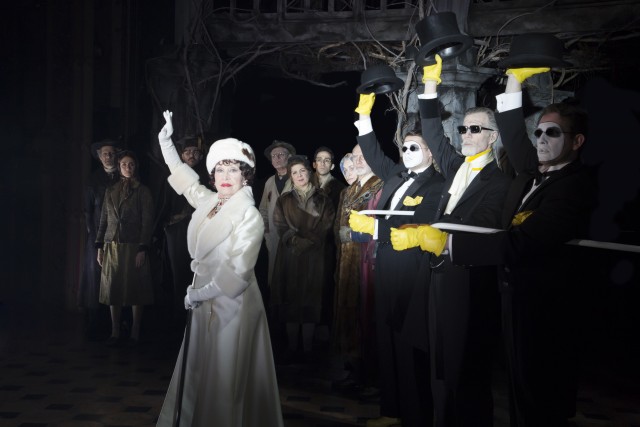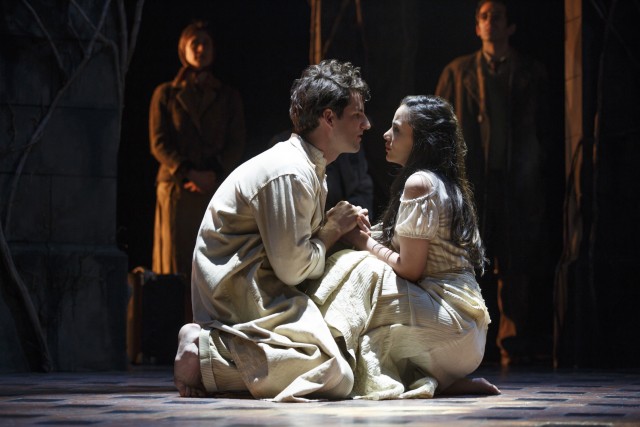
Chita Rivera returns to Broadway with a Tony-nominated performance in Kander and Ebb’s THE VISIT (photo by Thom Kaine)
Lyceum Theatre
149 West 45th St. between Sixth & Seventh Aves.
Tuesday – Sunday through September 6, $29 – $149
thevisitmusical.com
On April 28 at the Lyceum Theatre, an enormous ovation greeted Chita Rivera as she took the stage, front and center, from an adoring Broadway crowd. Her character arrived in tow with a coffin, but this was a joyous celebration of life. Rivera most likely is justly lauded every night at this moment, but there was something extra in the air this time, as the eighty-two-year-old actress had been nominated for her tenth Tony Award earlier that day. (She won in 1984 for The Rink and in 2006 for Chita Rivera — A Dancer’s Life.) In John Kander and the late Fred Ebb’s The Visit, Rivera is resplendent as Claire Zachanassian, an oft-widowed billionaire who has returned to her hometown, a rotting European corpse known as Brachen. Dressed in a dazzling white gown, she shines among the gray, dank villagers who have gathered to welcome her in a dilapidated railway station overgrown with tree branches (splendidly designed by Scott Pask). They think she has come back to rescue them from their hell —her former lover, Anton Schell (a fine Roger Rees), has particularly high hopes — but they are sadly mistaken, as she has returned for revenge and justice. It’s too bad that the rest of this musical, really more of a play with songs, does not do her similar justice. “Justice, madam?” Mayor Peter Dummermut (David Garrison) asks. “I wish to buy justice,” Claire says. “But justice cannot be bought, madam,” the mayor points out. “Everything can be bought,” Claire responds, then proves it.

Ghostly lovers from the past (John Riddle and Michelle Veintimilla) hover over the dastardly dealings in THE VISIT (photo by Joan Marcus)
Adapted by Tony winner Terrence McNally (It’s Only a Play, Master Class) from the 1956 play by Friedrich Dürrenmatt, The Visit, featuring music by Kander and lyrics by Ebb, the masterminds behind Cabaret and Chicago, has had a long journey to Broadway, gestating since 2001, always with Rivera The Mystery of Edwin Drood, West Side Story) as the star. For its Great White Way debut, director John Doyle (Sweeney Todd, Company) has assembled quality parts, but he never fully commits to any of the show’s numerous concepts, resulting in a baffling tale that is more like an overextended short story than a one-hundred-minute musical. When Claire explains that several of her body parts are artificial, Anton asks, “Is there anything left that’s real?” Touching her heart, Claire replies, “Here, Anton, as you shall see.” But The Visit doesn’t have an emotional core, instead ranging among ideas that are left hanging, remaining unexplained. As the townsfolk, including police chief Otto Hahnke (Aaron Ramey), schoolmaster Frederich Kuhn (Jason Danieley), hospital head Hans Nusselin (Timothy Shew), Father Josef (Rick Holmes), and Anton’s wife, Matilde (Mary Beth Peil), and children, Karl (George Abud) and Ottilie (Elena Shaddow), consider the future of Brachen, the past is ever-present, in the ghostly form of young lovers Anton (John Riddle) and Claire (Michelle Veintimilla), who are always onstage, but they go from an intriguing and beautiful motif to an overused device. Claire is accompanied by her strange butler (Tom Nelis) and a pair of oddly named and made-up blind eunuchs, Jacob Chicken (Chris Newcomer) and Louis Perch (Matthew Deming), whose existence and purpose don’t make complete sense. The only color comes from bold splashes of yellow; although a dance number choreographed by Graciela Daniele (Ragtime, The Rink), in which the characters, wearing bright yellow shoes, sit on Claire’s luggage, moving their legs and feet, is charming and funny, the tincture comes out of nowhere, color for color’s sake; if it is supposed to represent the town’s cowardice, it doesn’t come off that way. It’s the staging that ultimately lets down a bravura performance by Rivera, a quality book by McNally, and a game cast, left to wander through Doyle’s perplexing choices much as the characters wander through the remains of a once-prosperous town, making this Visit not worth a visit.